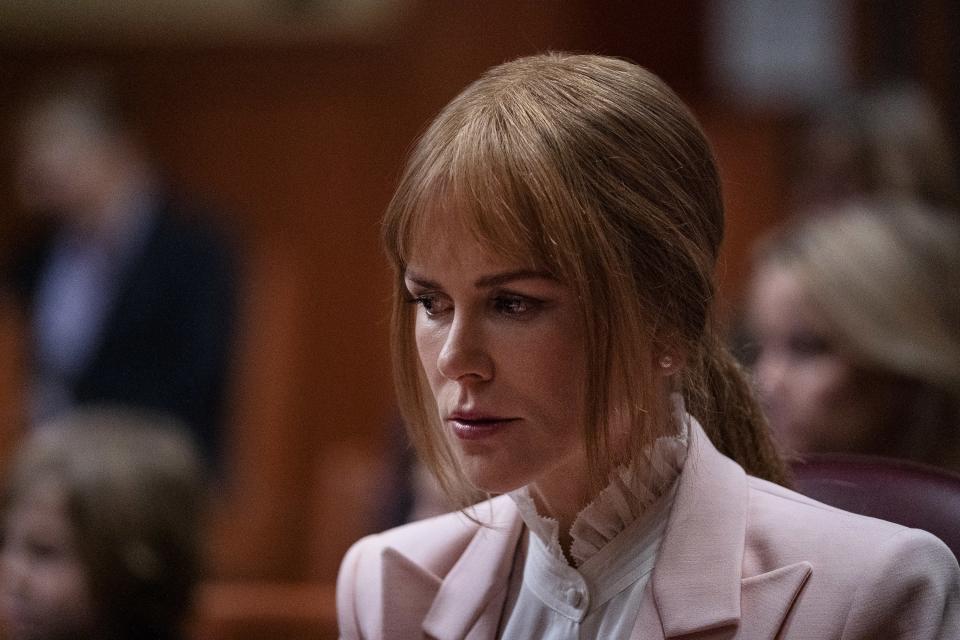Celeste’s Courtroom Scene Should Be Required Viewing for All Women
By this point I’ve said this about every single actress on Big Little Lies, but here goes: Just give Nicole Kidman all the Emmys. Not even just in her category. I mean we should collect every single Emmy that exists in the world, tear them from their display cases, and carve Nicole freakin’ Kidman’s name into them. Her work on season two of Big Little Lies is that good.
Last night's dramatic season finale gifted us with the highly anticipated face-off between Celeste (Kidman) and her mother-in-law, Mary Louise (the inimitable Meryl Streep). A lot had led up to this moment: The second season tracked a vicious, slow-bubbling resentment between Celeste and her late husband’s mother, which culminated in Mary Louise's taking Celeste to court for custody of her twin boys. Celeste fought like hell to keep her kids. And in doing so, she showed us how real-life women—especially women who have been abused, raped, or trapped in a harrowing relationship—are true heroes.

Over the past few years, female consumers have been blessed with an expanding range of heroes to choose from and identify with—including but not limited to Wonder Woman, Captain Marvel, and the just-announced female Thor (to be played by Natalie Portman). We've be given kickass secret agents like Charlize Theron in Atomic Blonde and the recently cast Lashana Lynch, who will reportedly star as Agent 007 in the next James Bond movie. We finally even have queer heroes like our new Batwoman, Ruby Rose. All these women are strong and able to roundhouse-kick a man clear across a room, but there’s another type of female strength that's important, if not necessary, for women to see onscreen: that of women like Celeste.
In season two of Big Little Lies, Celeste showed perseverance in the face of her own pain—which, in my view, is a highly female experience. This woman endured. She was the victim of domestic violence and sexual assault at the hands of her husband, a serial abuser (who's also father to Jane’s son, Ziggy, as a result of rape). In the season-one finale, Bonnie (Zoë Kravitz) saved Celeste from yet another beating by pushing Perry (Alexander Skarsgärd) down a flight of stairs and killing him. In season two Celeste grapples with her complex feelings about her husband’s death as she remembers the happier times they shared, despite her pain and probable relief. Amid all this, she must face her mother-in-law in a custody battle. She's asked to unfairly relive her traumas by sharing them with the court just so she can hang on to the one sliver of goodness and normalcy she has left in her life: her children.
The key word here is unfairly. Too many women have suffered like Celeste, whether it be from domestic violence, sexual assault, any sort of physical abuse, or even being asked to defend their ability to mother. It’s unfair that women are asked to endure and persist and persevere. But they are, consistently. And they do, constantly.

Celeste has always been painted as the daintiest member of the Monterey Five—she was the demure, stylish, slender wife to the stereotypically (toxically) masculine Perry. But I won’t say she was depicted as weak, because she is not and has never been weak. She's been beaten down, physically and metaphorically, but in the season two finale we see her rise.
As Mary Louise so graciously pointed out in court, Celeste had a slew of one-night stands, a scuffle with an Ambien haze which led to a minor car accident, and was tasked with raising two grief-stricken children while attending therapy for her own trauma. And through it all, she peeled every part of herself off the ground and sculpted herself into a composed, acute lawyer. A woman capable of winning her own custody battle. Watching Celeste win her courtroom battle in the face of such anguish was nothing short of heroic.
I’m grateful for the array of female characters women have to look up to these days, but unfortunately, in real life we don’t have masked or caped superheroes zipping through our skies and saving us from evil. So I think it’s important for us to reexamine and identify who gets to be called a hero. For me, especially right now, when our very rights and livelihoods are being called into question (yet again), those heroes are women like Celeste. Strong women who have every reason to stop pushing forward, women who are justified in giving up but who exercise every iota of strength they have left. That’s real female strength and heroism, because we’ve seen that woman IRL. We see her every day.
Originally Appeared on Glamour

